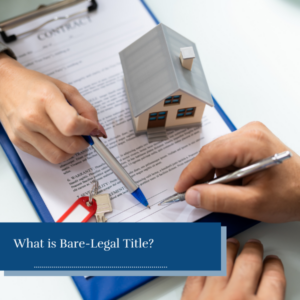What is Bare-Legal Title?

“Bare-legal title” is a somewhat imprecise term used to denote those instances when the legal record of ownership is separated from the equitable fact of ownership. This post is the first of several in which we will consider how those instances are treated under North Carolina state law and, in turn, how bare-legal title operates within bankruptcy law vis-à-vis one of these two owners and an unrelated third-party creditor. In other words, the dispute we are examining here is not the record owner versus the equitable owner. It is the record owner and one of their creditors, or the equitable owner and one of their creditors.
This discussion assumes there is such a thing as the “record owner” of the asset in question in the first place. Real estate records ownership by deed. Vehicles and boats record ownership by a certificate of title. Both kinds of records are filed with the state of North Carolina, either through a county’s Register of Deeds Office or through the Department of Motor Vehicles. Less precisely, certain other personal property may document ownership through a certificate bearing the record owner’s name and the serial number (or other identifying characteristic) of the asset. One can imagine, for instance, the purchase of construction equipment or a valuable vintage guitar involving such documents, notwithstanding the fact that the state of North Carolina has no formal way of recording those purchases.
Here Are Some Examples of Situations Where Bare-Legal Title Arises
An elderly man, James, transfers his home to one of his adult sons, Chris, as an estate-planning device. Chris did not pay his father for the property, nor does Chris live there or pay for its maintenance, insurance, or property taxes. James has expressed the wish to his family that when he dies, Chris should sell the house and distribute proceeds equally among his children. In this situation, Chris holds “bare-legal title” to the property. What effect does this arrangement between James and Chris have on their creditors?
A legal resident of North Carolina, Juan, has a family member, Jose, who is in the United States illegally. Jose pays cash for a truck but titles the truck in Juan’s name because Jose is worried about how registering the truck in his own name might affect his immigration status. In this situation, Juan holds a “bare-legal title” to the truck. What effect does this arrangement between Juan and Jose have on their creditors?
In one sense, the meaning of ownership is self-evident. Try taking a toy away from a three-year-old and you’ll receive an immediate lesson in its meaning. In another sense, though, ownership can be complicated. “I had it first,” “I was using it,” “finders-keepers-losers-weepers,” and finally, most elementally, “It’s mine!” are all concise statements of laws that have equal purchase on the playground and in the courtroom.
“Ownership is the guarantee of the law; possession is the guarantee of the facts. It is well to have both forms if possible; and indeed they normally co-exist.” (John Salmond, Jurisprudence 311 (Glanville L. Williams ed., 10th ed. 1947) quoted in Black’s Law Dictionary under “Ownership”). And, indeed, they normally do co-exist. But not always. Sometimes the law and the facts diverge. When a third-party creditor is involved, do the circumstances of an asset’s possession, the intent of the parties, or the sheer man-on-the-street sense of fairness tip the scales in one direction or another? In the upcoming posts, that’s what we’ll be studying to find out.
- About the Author
- Latest Posts
For more than 20 years, the Sasser Law Firm has been helping individuals and business owners sort through financial hardships to see the light at the end of the tunnel. Our North Carolina bankruptcy attorneys are all board-certified specialists, which means we have passed a complex exam, undergone a thorough peer review, and continue to earn legal education credits in this ever-evolving area of law.














